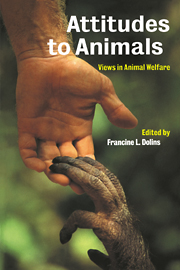Book contents
- Frontmatter
- Contents
- List of contributors
- Acknowledgements
- Part I Attitudes to animals
- 1 A look back in the mirror: perspectives on animals and ethics
- 2 Me and my totem: cross-cultural attitudes towards animals
- 3 Sheep in wolves' clothing? Attitudes to animals among farmers and scientists
- Part II Animal awareness
- Part III Animal welfare
- Part IV Research and education
- Part V Epilogue: the future of wild animals
- Index
2 - Me and my totem: cross-cultural attitudes towards animals
Published online by Cambridge University Press: 16 November 2009
- Frontmatter
- Contents
- List of contributors
- Acknowledgements
- Part I Attitudes to animals
- 1 A look back in the mirror: perspectives on animals and ethics
- 2 Me and my totem: cross-cultural attitudes towards animals
- 3 Sheep in wolves' clothing? Attitudes to animals among farmers and scientists
- Part II Animal awareness
- Part III Animal welfare
- Part IV Research and education
- Part V Epilogue: the future of wild animals
- Index
Summary
Human beings are part of the so-called animal kingdom. Universally, we humans seem to sense or intuit our proximity and affinities with other animals yet likewise require our distinct identity from other animals. Anthropology by definition is overtly anthropocentric and speciesist, relegating non-human animals to the category of ‘other’. Ironically then, when looking cross-culturally, most humans to some extent appear to categorize certain animals, depending on culturally specific criteria, as allo-animals, as allegorical and/or mythological and totemic stand-ins for them(our)selves! Other creatures are a fact of life in our greater ecological niche(s), but other creatures also seemto hold a place in the universal human psychic ‘niche’ as well. In a culturally malleable, dynamic system, humans seem simultaneously to anthropomorphize and yet polarize other animals, recognizing both the close links and the dilemmas inherent in the intimacy. The dog can be best friend, or frightening assailant, or even dinner, largely depending upon cultural constructions, and depending on how the identity and power issues of the dog are specified by the humans involved. The tension of this self/other dynamic which we have towards other animals forms the core impulse behind all cross-cultural attitudes toward animals, no matter the superficial, specific, ethnographic variations in behaviours and feelings about animals.
In the ethnographic record, each culture has many ways in which animals interact with people, physically and metaphorically; likewise, each culture includes a variety of culturally specific attitudes toward specific other species.
- Type
- Chapter
- Information
- Attitudes to AnimalsViews in Animal Welfare, pp. 12 - 25Publisher: Cambridge University PressPrint publication year: 1999
- 9
- Cited by



